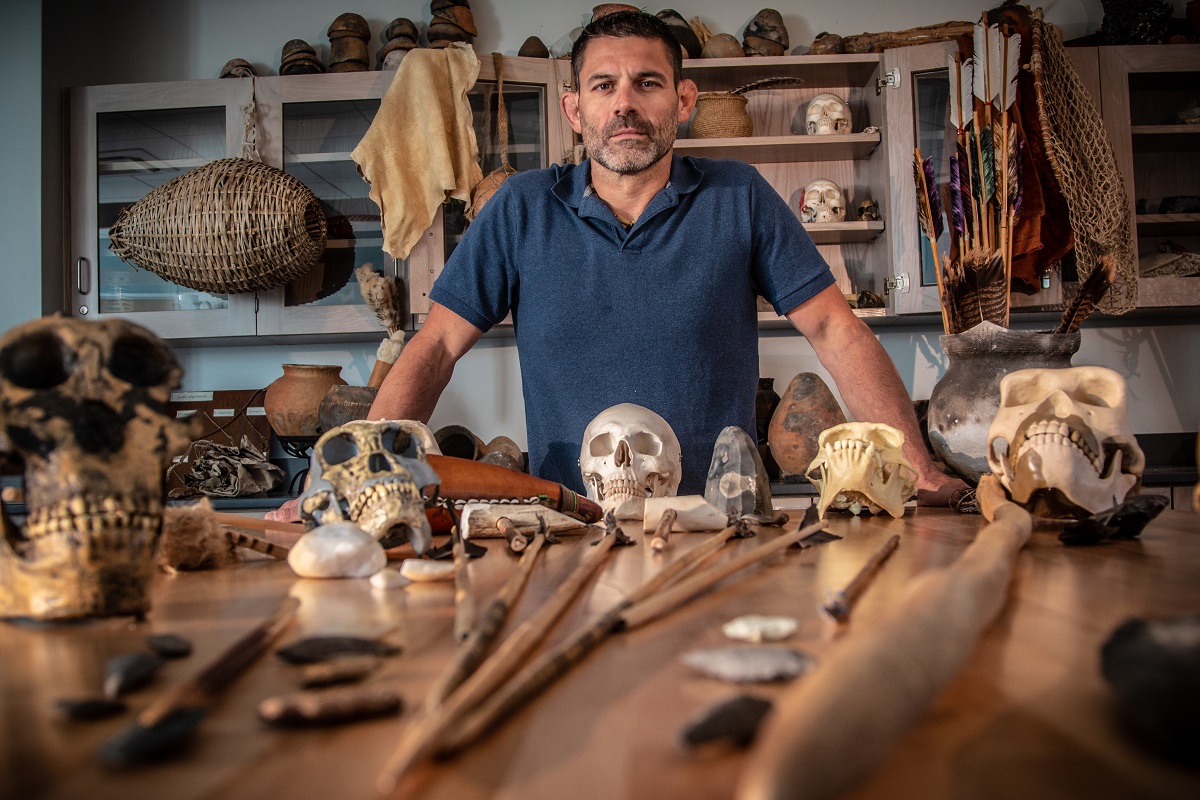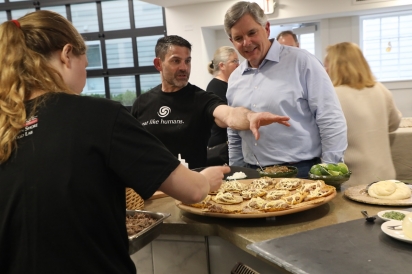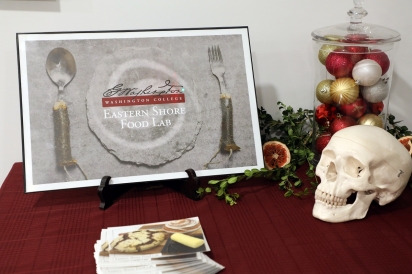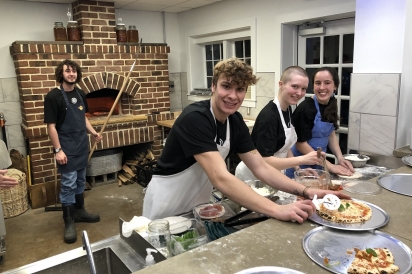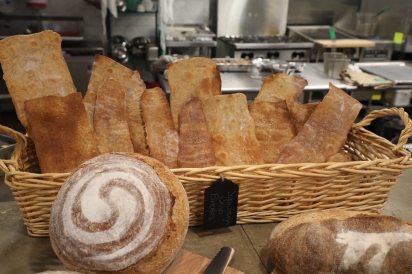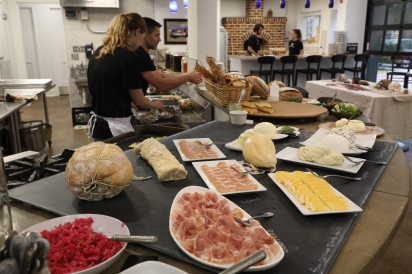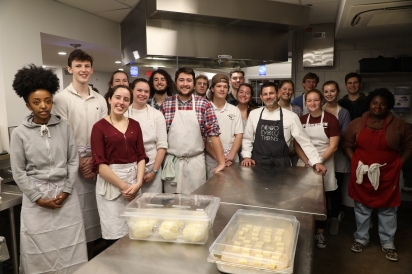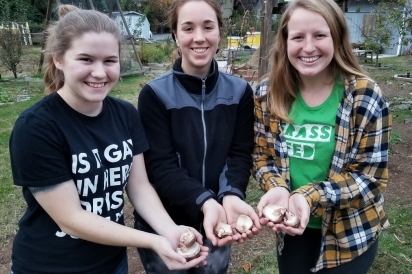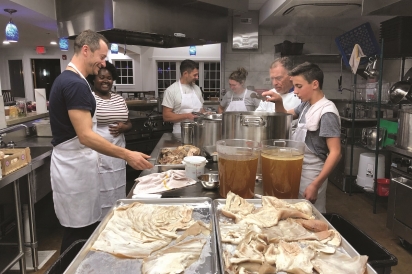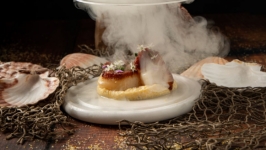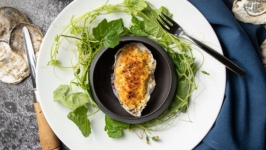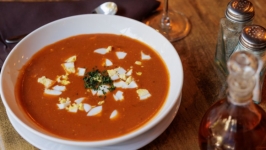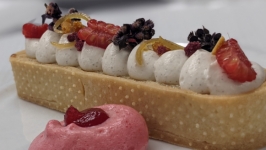Hungry to Learn: Bill Schindler and the Eastern Shore Food Lab
Exploring Food, Process, and People with Anthropologist Dr. Bill Schindler and the Eastern Shore Food Lab at Washington College (Photos courtesy Washington College)
It’s a cold, dark night in Chestertown, Maryland, but the windows of the new Eastern Shore Food Lab at Washington College glow warmly, attracting hungry foodies to the event inside. The local buzz around the Lab is considerable. The renovations of the new Food Lab spaces, formerly a much-loved downtown restaurant, have taken over a year and there’s been great speculation about how the new space will look. There’s been even greater speculation about what it will do. Launched as the brain child of the charismatic, dynamic Washington College anthropologist Bill Schindler as an “interdisciplinary research, teaching, and production laboratory,” the community has been largely scratching its collective head about what that mouthful of jargon means in practice. So tonight, the Chestertown old guard is flanked by regional gourmands, college students and well-heeled restauranteurs here to see and taste the Lab’s future promise.
It tastes like fat. The richest, most savory impasto of garlicky butter smeared on a crust of bread, layered with a slice of prom-dress-pink beef. It’s hardly a surprise. Bill Schindler loves fat—and marrow, and innards. Just like our forebearers, Schindler believes in using it all—the whole animal, the environment it lived it, the community it sustained—with nothing going to waste. Tonight, on the first evening event at the Food Lab, he’s invited the public to meet his friend, chef John Nocita. As we slowly eat our way through a series of courses designed around Nocita’s snout-to-tail approach to food, Schindler shares his vision for the Food Lab and its place in this community, Washington College, and as a disruptor of American food culture. “The power of food,” Schindler says, “can transform who we are and what we are. We’ve lost our connection to food and because of that, we’ve lost our community environment at the table. But we can get that back.”
There may not be a better person to help us individually and collectively reconnect to our forsaken foodways than Bill Schindler. An Associate Professor of Anthropology at Washington College, Schindler describes himself as a specialist in primitive technologies who lives his work. His research—and work with students—explores how we think historically about our human relationship with the fundamental necessity of food, from the tools we’ve made to hunt it to how we’ve foraged, prepared and processed food. This is not theoretical research. As an academic, Schindler prefers an experiential approach. Students and Schindler himself are far more likely to be tinkering with actual tendons or taste-testing crickets as a protein form than reading dense anthropological theses.
Perhaps the pinnacle of Schindler’s ethos was his starring role in National Geographic’s 2016 The Great Human Race, in which he and his costar Cat Bigney were challenged to live as our primitive ancestors did—employing period-correct Stone Age tools, clothing, and hunting and gathering techniques to survive across the globe. In it, Schindler’s utter commitment to his grand academic experiment—to understand early man’s survival by living it—is complete. He hunts with spears, he cleans his kill and eats it, he sleeps in trees, and by the end of the series you’re left with the impression that as messy, uncomfortable, cold or brutal as it gets, Schindler enthusiastically welcomes the learning opportunities gleaned from these experiences. It is the real-world application of his belief that by going back to man’s earliest relationship with food we can inform and support our contemporary food realities. And from his perspective, the best way to translate that to the public, barring a quick trip to the Stone Age, is the Washington College Food Lab.
Even on a regular weekday, the Lab has an air of mystical food alchemy. Mason jars of floating mystery meat line the countertop like Smithsonian specimens, and in the open kitchen, vats of fermenting French fries bubble and froth. It’s a bright, contemporary space outfitted with technical-looking lab equipment: climate-controlled walk-in cheese caves, a contraption just for corn ‘nixtamalization.’ Schindler, drinking a pour-over coffee from student-roasted Rise Up beans, looks perfectly at home. These, after all, are the fruits of his vision—the tools to reconnect the food we eat with the nutrients we’ve lost in our global pursuit of efficient, large-scale food production and processing.
“We’re not concentrating on the stuff in the middle,” Schindler says. “After it comes out of the field or the woods or the stall, but before it goes onto our plate—that’s where the magic happens. That’s where we’re most disconnected from our food and that’s why we need to look to our dietary past and three million years of technological change that built us as a species.”
Schindler’s goal in the Food Lab—to bring us collectively back to the loving, patient, hands-on preparation of everyday food—has a multi-faceted approach. The first is research-based, to find and preserve food traditions through experimental archaeology and anthropological work with tradition-bearers like John Nocita. That research will then be used to forge a new path forward, integrating global food sourcing and preparation traditions with contemporary expectations of food taste and presentation. The second is research implementation—whether student and college centered or with the local and regional community.
“We want people coming through these doors and learning, using all of their senses, how to produce these foods in their own homes through all sorts of classes,” says Schindler. This spring’s workshops, “On the Rise: Reclaiming Our Approach to Baking Nutritious Bread,” and “On the Moove: How to Make Fermented Dairy Products in Your Own Home!” are the Lab’s first two forays, to be followed by many more in the fall. Since opening, the Lab’s doors have also been open to the public on First Fridays for ‘casual’ snacks à la Food Lab—those fermented French fries (delish!) and nixtamalized Mexican hot chocolate were one evening’s offerings— as a sort of community-education-through-their-stomachs.
Of course, the Eastern Shore Food Lab is, at its heart, an academic enterprise. First and foremost, the Lab was developed as an immersive educational experience for students—a way to transform their expectations and understanding of food sourcing, preparation, and process through the act of foraging, cooking, experimenting, and eating. Unsurprisingly, Schindler’s passion and enthusiasm combined with his total commitment to immersive experiences makes him one hell of a college professor. Schindler’s classes have had students on foraging permaculture field trips harvesting dandelion, curly dock, violet, and shepherd’s purse for lunchtime salad fixings, employed as worker bees to harvest honey from beehives on the College campus, and making maple beer from Washington College’s own tapped maple trees. Schindler’s students have filtered seawater to make their own salt, pickled magnolia blossoms and made mead to celebrate May Day, and have cultivated sourdough cultures in their dorm rooms. They are, in short, having an unforgettable college experience—one that will change the way they see food forever. Which is precisely what Schindler intended.
Kailani Clarke, Washington College class of ‘20, (above left photo, in center) is one of the passel of student interns staffing the Eastern Shore Food Lab. A diehard Schindler disciple, she’s worked in the Washington College campus garden alongside him and other Lab staff and has taken his classes, all of which had a marked impact on her college experience and plans for her future after graduation. You can find her at the Lab on open house nights, wearing the Lab’s signature black tee shirt with its “Eat Like Humans” message and greeting community members with slices of the Lab’s brick-oven pizza (all made from scratch, of course).
Her most memorable Food Lab internship experience to date is unmistakably, well, Schindlerian. “Dr. Schindler had brought traditional Icelandic food back from a trip, which is actually the fermented flesh of the Greenland shark,” Clarke says. “The skin and flesh are toxic but about 400 years ago, somebody figured out that if you bury this carcass in the ground, it ferments and the flesh becomes edible. Unfortunately, it smells like pee…and its flavor, well, it’s hard to forget.” According to Clarke, this shark sampling is both typical of and unique to the Food Lab. “Dr. Schindler will say, there’s this amazing food thing that’s going on. I want to share it with you, I want to share it with the community— let’s just do it.”
Clarke does not envision herself in following a culinary path—indeed, creating future chefs is not the goal of the Lab. Rather, she sees the Lab’s classes and experiences providing a more nuanced perception of food and the environment realized through immersive education. “The kind of things we learn in the Lab can’t be taught of out a book—because you can’t explain what a kombucha SCOBY (symbiotic community of bacteria and yeast) smells like unless your nose is in it,” Clarke says. “This kind of learning is really rewarding to me—to break out of the classroom and have a change of pace. Practically, this is the way I want to eat in the future, and the way I want to share food with others, to prepare food, to connect with our past and the way our ancestors ate.”
Clarke continues, echoing the sentiments of Schindler, the Lab team, Washington College and the community at large. “Watching the Food Lab evolve has been very exciting to me. It was a brain trust—a crazy dream. And through a lot of work and a lot of imagination they’re making it happen for students and the community. And I get to help be a part of that.”
About the Food Lab
The Eastern Shore Food Lab at Washington College is a research, teaching, and production space in downtown Chestertown that hosts student interns, classes, and community events addressing issues of food, diet, health, sustainability, and human and environmental relationships. Their mission, using food to reconnect with what it means to be human, is embodied through hands-on experiential learning. Learn more about their programs or sign up for a public workshop on their website, or visit them on Facebook.


